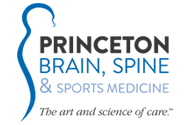Herniated & Bulging Discs
Lumbar & Cervical Disc Herniation
Non-Surgical & Minimally Invasive Treatment
You have probably heard the phrases “slipped disc” or “ruptured disc.” While these terms are descriptive, they can be misleading. Most of the time, patients using these terms are referring to disc herniation. Disc herniations are common, especially in the lower back/lumbar spine. Princeton Brain, Spine & Sports Medicine neurosurgeons are proud to provide pain relief and treatment for herniated and bulging discs at our PA and NJ neurosurgery campuses.
What Is a Bulging Disc?
Also called a “disc protrusion,” a bulging disc is quite common and most often found in the lumbar spine. As the outer fibrous portion of our discs weaken with age or use, pressure can build from the center, causing one side of the disc to stretch out or “bulge.” While some bulging discs do not put pressure on nerves and are not symptomatic, others can cause weakness, tingling and pain. When symptoms go untreated, a bulging disc may become a herniated disc—so it is wise to have disc-related back pain promptly assessed. Most of the time, conservative, non-surgical approaches benefit patients with bulging discs.
Conservative Treatment of Herniated Discs
The physicians at Princeton Brain, Spine & Sports Medicine Care provide the latest technologies in the ever-changing world of surgical pain management. Conditions treated include the management of intractable pain syndrome, failed back syndrome, cancer pain, trigeminal neuralgia, occipital neuralgia and others.
Most cases of neck and back disc herniation do not require surgery. Long-standing evidence suggests that pain associated with a herniated disc may diminish without surgical treatment in four to six months. To relieve discomfort and manage pain, the PBSSM team prescribes non-surgical, conservative treatment for herniated discs:
- Pain medication. Your sports medicine or neurosurgery specialist may prescribe NSAIDs (non-steroidal anti-inflammatories), muscle relaxants or short-term narcotic painkillers for acute disc pain. In severe cases, we may also recommend an epidural steroid injection.
- Heat & cold therapy. This is especially helpful during the first 24 to 48 hours after disc herniation.
- Physical therapy. Exercises like gentle massage, stretching and strengthening may decrease pain and improve flexibility.
Surgical Treatment from Disc Herniation
When non-surgical treatment fails to relieve a patient’s pain, or if there is evidence of neurological deficit (muscle weakness or loss of sensation), PBSSM neurosurgeons may recommend surgery to treat disc herniation.
Discectomy & Laminectomy
Surgery may involve removing part or all of the damaged disc (discectomy). This procedure can often be done using small incisions and specialized equipment like microscopes and endoscopes. This minimally invasive surgery often results in expedited recovery, reduced muscle trauma and less blood loss than traditional “open” spine surgery. In addition to the discectomy, a portion of the bone covering the nerve may also need to be removed (laminectomy).
Spine Fusion
Rarely required for first-time herniation, a spine fusion replaces a damaged disc with a bone graft from the hip. This bone graft “fuses” vertebrae together with the help of specially designed rods, screws and metal cages. This instrumentation helps to stabilize a weak or damaged spine.
Recovery from Surgical Disc Treatment
At our practice, most patients begin getting out of bed on the same day surgery is performed. Most patients return home without 24 hours after their disc procedure (depending on the extent of surgery). We strive to keep you as comfortable as possible during early recovery, managing post-surgical pain with as-needed pain medications. We will discuss a schedule for reducing post-operative pain, increasing flexibility and returning to walking, driving, light lifting and higher intensity activity.
Contact Princeton Brain, Spine & Sports Medicine
With campuses conveniently located throughout New Jersey and northeastern Pennsylvania, Princeton Brain, Spine & Sports Medicine and Princeton Brain, Spine & Sports Medicine are focused on returning you to optimal health. Blending old-fashioned medicine with minimally invasive surgical innovation, our renowned neurosurgeons educate you about disc treatment options and empower you to make informed healthcare decisions.
Join the PBSSM family today: connect online or call 609.921.9001 in NJ or 215.741.3141 in PA.
Request an Appointment
Submit an appointment request on our patient portal or contact our New Jersey and Pennsylvania campuses to speak with a patient advocate.
